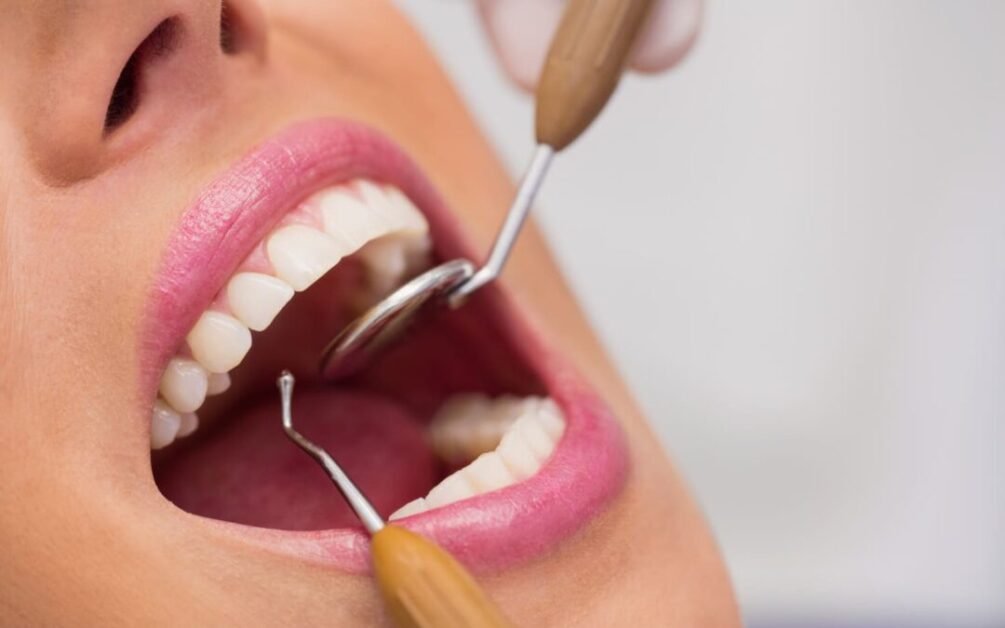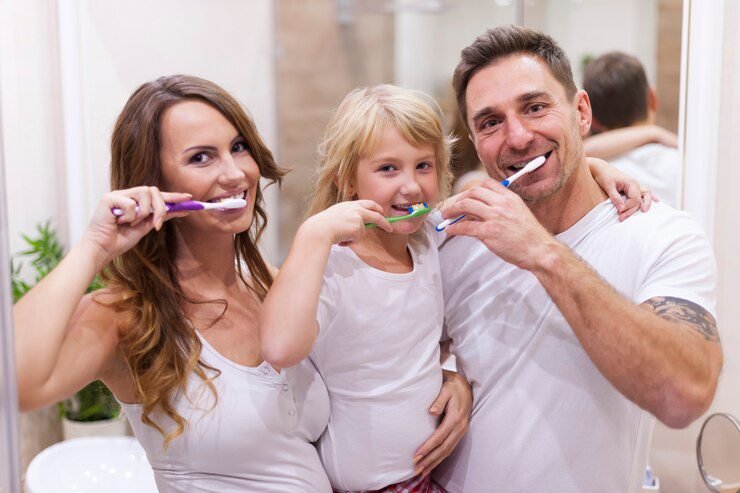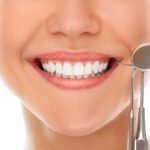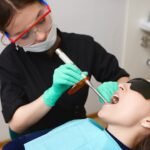Table of Contents
The Importance of Oral Health in Achieving a Healthy and Happy Smile

Oral health plays a crucial role in achieving a healthy and happy smile. It goes beyond just having straight and bright teeth; it encompasses the overall well-being of an individual. Maintaining good oral hygiene practices not only prevents dental problems but also promotes better overall health.
Research has shown that there is a strong link between oral health and various systemic diseases such as cardiovascular diseases, diabetes, and respiratory infections. Poor oral health can contribute to the development of these conditions, while good oral hygiene can help reduce the risk.
Moreover, a healthy smile can greatly impact one’s self-esteem and social interactions. A confident smile can boost self-confidence, making individuals more comfortable in social situations. It is often said that the smile is the most attractive feature of a person, and a healthy smile can enhance one’s overall appearance and create a positive first impression.
Taking care of your oral health should be a top priority in your daily routine. Establishing consistent oral care habits, such as brushing twice a day, flossing, and visiting the dentist regularly, can go a long way in maintaining a healthy and happy smile. Investing time and effort in oral health now can lead to long-term benefits for both your dental and overall well-being.
Understanding the Link Between Dental Health and Overall Well-being

Maintaining good oral health goes hand in hand with overall well-being. The link between dental health and our overall health has been extensively studied, and the findings consistently highlight the importance of a healthy mouth for maintaining optimal physical and mental well-being.
Research has shown that poor dental health is associated with a higher risk of developing various health conditions. For example, gum disease has been linked to an increased likelihood of heart disease, stroke, and even diabetes. The inflammation and bacteria in the mouth can enter the bloodstream and contribute to the development of systemic inflammatory conditions. Similarly, untreated tooth decay can lead to infections, abscesses, and even jaw problems, impacting not only our dental health but also our quality of life.
It is clear that taking care of our teeth and gums is not just about achieving a bright smile or fresh breath. It is essential for our overall health and well-being. By recognizing the profound connection between dental health and our overall health, we can make informed choices and prioritize our oral care routine to promote a healthier and happier life.
Establishing a Consistent Oral Care Routine for a Brighter Smile

Establishing a consistent oral care routine is essential for maintaining a brighter smile and overall oral health. By incorporating good habits into your daily routine, you can effectively prevent dental issues such as tooth decay, gum disease, and bad breath.
The first step in establishing an oral care routine is to ensure proper brushing technique. Use a soft-bristled toothbrush and fluoride toothpaste to gently clean all surfaces of your teeth, including the inner and outer surfaces, as well as the chewing surfaces. Remember to brush for a minimum of two minutes, twice a day, to effectively remove plaque and food particles. Additionally, don’t forget to replace your toothbrush every three to four months or sooner if the bristles become frayed.
In addition to regular brushing, flossing plays a crucial role in maintaining oral hygiene. It is recommended to floss at least once a day to remove plaque and debris from between the teeth and along the gum line, where your toothbrush cannot reach. Proper flossing technique involves gently sliding the floss between your teeth and curving it around each tooth in a C-shape motion. This motion helps remove any trapped particles and prevents the buildup of plaque.
Aside from brushing and flossing, incorporating mouthwash into your routine can enhance your oral care. Mouthwash helps kill bacteria, freshens breath, and promotes overall oral health. Choose a mouthwash that is alcohol-free and contains fluoride to further strengthen your teeth and prevent tooth decay.
By establishing a consistent oral care routine that incorporates brushing, flossing, and using mouthwash, you can ensure a healthier, brighter smile. Remember, a beautiful smile starts with good oral hygiene habits. Stay tuned for more tips on maintaining optimal oral health and achieving a confident smile.
Exploring the Benefits of Regular Dental Check-ups and Cleanings
Regular dental check-ups and cleanings play a crucial role in maintaining optimal oral health and preventing various dental problems. These routine visits to your dentist not only help in keeping your teeth and gums clean and healthy but also offer numerous benefits for your overall well-being.
During a dental check-up, your dentist will thoroughly examine your teeth, gums, and oral cavity, looking for any signs of dental issues such as cavities, gum disease, oral cancer, or other abnormalities. Early detection of these problems allows for prompt treatment, preventing them from progressing and causing further damage. In addition, regular cleanings performed by your dental hygienist help to remove plaque and tartar buildup, which can lead to tooth decay and gum disease if left untreated. These check-ups and cleanings are essential in maintaining good oral hygiene and preventing the need for more extensive and costly dental procedures down the line.
Choosing the Right Toothbrush and Toothpaste for Effective Oral Hygiene
Choosing the right toothbrush and toothpaste is a crucial step in maintaining effective oral hygiene. With the wide variety of options available on the market, it can be overwhelming to determine which products are best suited for your specific needs. However, by understanding the key factors to consider, you can make an informed decision that will contribute to a healthier and brighter smile.
When it comes to selecting a toothbrush, it is essential to find one with soft bristles. Hard bristles may seem more effective at removing plaque, but they can actually cause damage to the gums and tooth enamel. Soft bristles are gentle on the teeth and gums while still effectively removing plaque and debris. Additionally, consider the size and shape of the toothbrush head. A smaller head allows for better maneuverability and access to hard-to-reach areas, ensuring a thorough cleaning.
In terms of toothpaste, it is important to choose one that contains fluoride. Fluoride is a mineral that helps prevent tooth decay by strengthening the enamel and making it more resistant to acid attacks from plaque bacteria and sugars in the mouth. Look for toothpaste with the American Dental Association (ADA) Seal of Acceptance, ensuring that it has undergone rigorous testing and meets the highest standards of safety and efficacy. Additionally, consider specific needs such as sensitivity or whitening, and opt for toothpaste formulated to address those concerns. By choosing the right toothbrush and toothpaste, you can enhance your oral hygiene routine and contribute to a healthier smile.
Certainly! Here is a table that summarizes the factors to consider when choosing the right toothbrush and toothpaste for effective oral hygiene:
| Factor | Toothbrush | Toothpaste |
|---|---|---|
| Bristle type | Choose a toothbrush with soft bristles that are gentle on your teeth and gums. | Choose toothpaste that contains fluoride. |
| Size and shape | Choose a toothbrush with a small head and a bristle design that helps you to get to the hard-to-reach places of your mouth. | Choose toothpaste that comes in a size and flavor that you like. |
| Manual vs electric | Both manual and electric toothbrushes effectively remove plaque, but electric toothbrushes have advantages. Electric toothbrushes with rotating or oscillating heads provide better cleaning. | – |
| Fluoride content | – | Fluoride is a mineral that helps prevent tooth decay. Choose toothpaste that contains fluoride. However, avoid swallowing too much toothpaste, as excess fluoride can be harmful. |
| Whitening | – | Toothpaste with whitening agents like baking soda or hydrogen peroxide can whiten teeth. However, this toothpaste may be too harsh for individuals with sensitive teeth. |
Incorporating a Balanced Diet for Optimal Dental Health
A balanced diet plays a crucial role in maintaining optimal dental health. By incorporating the right nutrients into your daily meals, you can support the health of your teeth and gums, preventing common dental issues such as cavities and gum disease.
One of the key components of a balanced diet for dental health is calcium. Calcium is essential for the development and maintenance of healthy teeth and bones. It helps strengthen tooth enamel, which is the protective outer layer of the teeth. Good sources of calcium include dairy products, leafy green vegetables, almonds, and fortified foods.
In addition to calcium, it is important to include foods rich in vitamins and minerals that support oral health. Vitamin C, for example, helps maintain healthy gums and assists in the healing process. Foods such as citrus fruits, strawberries, and bell peppers are excellent sources of this vitamin. Vitamin D, on the other hand, helps the body absorb calcium, making it easier for teeth to stay strong. Fatty fish, eggs, and fortified dairy products are good sources of vitamin D. By incorporating these nutrients into your diet, you can support the health and wellness of your teeth and gums.
Avoiding Habits that Harm Your Teeth and Diminish Your Smile
Maintaining a healthy and radiant smile goes beyond just brushing and flossing regularly. In fact, there are certain habits that can significantly harm your teeth and diminish the beauty of your smile. By being aware of these habits and making conscious efforts to avoid them, you can preserve the health and aesthetic appearance of your teeth.
One common habit that can be detrimental to your teeth is smoking or using tobacco products. Not only does tobacco stain your teeth and cause bad breath, but it also increases your risk of gum disease, tooth decay, and even oral cancer. Quitting smoking or using tobacco not only improves your overall health, but it also helps safeguard the health and beauty of your smile.
Another habit to avoid is excessive consumption of sugary drinks and snacks. The bacteria in your mouth feed on sugars, producing acids that can erode your tooth enamel and lead to cavities. Limiting your intake of sugary foods and drinks can help protect your teeth from decay. Instead, opt for healthier choices like water, fruits, and vegetables, which are not only better for your dental health but also for your overall well-being.
By steering clear of habits like smoking and excessive sugar consumption, you can preserve the health and radiance of your smile. It’s important to remember that small changes in your daily routine can have a significant impact on your oral health. Stay committed to practicing good oral hygiene habits and making informed choices for the well-being of your teeth.
Understanding the Role of Stress in Dental Health and Finding Effective Coping Mechanisms
Stress is a common factor that affects various aspects of our lives, and dental health is no exception. Research has shown that stress can have a significant impact on oral health, leading to various oral conditions and even exacerbating existing ones. When subjected to chronic stress, the body’s immune system weakens, making it more susceptible to infections and diseases. This includes oral infections such as gum disease and tooth decay, which can result in pain, discomfort, and the need for extensive dental treatments.
But how does stress directly affect our dental health? One of the primary ways stress affects oral health is through habits that individuals may develop when under stress. For example, some people may turn to grinding or clenching their teeth, a condition known as bruxism, as a way to cope with stress. This constant pressure can lead to tooth damage, jaw pain, and headaches. Additionally, stress can also influence our lifestyle choices, such as opting for unhealthy coping mechanisms like smoking or consuming excessive amounts of sugary foods and drinks, which can have a detrimental effect on our teeth and overall oral health.
Finding effective coping mechanisms is crucial in managing stress and protecting our dental health. Engaging in stress-reducing activities, such as regular exercise, meditation, or seeking professional help, can significantly alleviate stress levels and improve oral health. Additionally, practicing good oral hygiene routines, including brushing twice a day, flossing daily, and using mouthwash, is vital in maintaining dental health. It is also essential to prioritize self-care and find healthy outlets for stress that do not compromise oral health, such as engaging in hobbies, spending time with loved ones, or pursuing relaxation techniques like deep breathing exercises. By actively managing stress and adopting healthy coping mechanisms, we can safeguard our dental health and enjoy a happier, healthier smile.
The Connection Between Sleep and Dental Health: Tips for Improving Both
Sleep plays a vital role in maintaining good overall health, and it has a direct impact on our dental well-being as well. During sleep, our bodies go through a process of repair and restoration, including our oral cavity. This makes sleep an essential factor in achieving optimal dental health.
One key aspect of sleep that affects dental health is breathing. When we sleep, our breathing patterns can change, leading to conditions such as sleep apnea. Sleep apnea is a disorder characterized by pauses in breathing or shallow breaths during sleep. This condition can have a significant impact on oral health, as it can lead to dry mouth, which increases the risk of tooth decay and gum disease. Seeking treatment for sleep apnea can not only improve sleep quality but also protect the health of your teeth and gums.
Furthermore, poor sleep quality or insufficient sleep can contribute to daytime sleepiness, which may lead to poor oral hygiene habits. When we feel tired, it’s easy to skip brushing and flossing before bed. However, neglecting oral care routines can lead to a buildup of plaque and bacteria, increasing the risk of cavities, gum disease, and other oral health issues. It’s essential to prioritize good sleep hygiene and establish a consistent oral care routine to ensure both a restful sleep and a healthy smile.
Enhancing Your Smile with Cosmetic Dentistry Options
Cosmetic dentistry offers a range of options to enhance your smile and improve your overall dental appearance. Whether you’re seeking to correct minor imperfections or completely transform your smile, these procedures can help you achieve the look you desire. From teeth whitening to porcelain veneers, cosmetic dentistry can address various concerns and provide long-lasting results.
One popular cosmetic dentistry procedure is teeth whitening, which can brighten your smile by several shades. This procedure is effective in removing stains caused by certain foods and beverages, tobacco use, and aging. Professional teeth whitening treatments conducted by a dentist can offer superior results compared to over-the-counter products, ensuring a safe and effective procedure.
Another option for enhancing your smile is porcelain veneers. These thin, custom-made shells are bonded to the front of your teeth to address issues such as chipped, uneven, or discolored teeth. Veneers can also help to close gaps between teeth and create a harmonious, natural-looking smile. With proper care, porcelain veneers can last for many years, providing you with a beautiful and confident smile.
If you’re considering cosmetic dentistry options, it’s important to consult with a qualified dentist who can assess your specific needs and recommend the most appropriate procedures. They will evaluate the condition of your teeth and gums, discuss your goals and expectations, and provide you with a personalized treatment plan. By choosing the right cosmetic dentistry options, you can enhance your smile and boost your self-confidence, ultimately leading to a happier and more fulfilling life.
The Power of a Confident Smile: Boosting Self-esteem and Social Interactions
A confident smile holds immense power, not only in boosting self-esteem but also in enhancing social interactions. When we feel good about our smile, we exude confidence and project a positive image, which can have significant effects on our overall well-being. Research has shown that people with healthy and attractive smiles are perceived as more trustworthy, successful, and approachable.
Having a confident smile can act as a catalyst for better self-esteem. When we are happy with our appearance, including our teeth, it can lead to an improved self-image and a greater sense of self-worth. This newfound confidence extends beyond our personal lives and can positively impact our professional endeavors as well. A confident smile can help us make a positive first impression during job interviews, business meetings, and social gatherings, thus opening doors to new opportunities. It allows us to interact with others more comfortably and fosters a sense of connection and rapport.
Teaching Children the Importance of Dental Health for a Lifetime of Smiles
Dental health is a crucial aspect of overall well-being, and instilling good oral care habits in children from a young age sets the stage for a lifetime of healthy smiles. As parents, educators, and caregivers, it is essential to teach children the importance of dental health and provide them with the necessary tools and knowledge to maintain optimal oral hygiene.
By teaching children about the significance of dental health, we empower them to take responsibility for their own well-being. Children should understand that proper oral care helps prevent tooth decay, gum disease, and other dental problems, allowing them to enjoy a lifetime of healthy teeth and gums. By emphasizing the importance of brushing teeth at least twice a day, using fluoride toothpaste, and flossing regularly, we can help children develop good oral care routines that will benefit them throughout their lives.
Additionally, educating children about the importance of a balanced diet and its impact on dental health is crucial. Encouraging a diet rich in fruits, vegetables, and dairy products while limiting sugary snacks and drinks can significantly reduce the risk of dental problems. By teaching children to make healthier food choices, we equip them with the knowledge to maintain good dental health as they grow.
Instilling the habit of regular dental check-ups among children is equally important. Regular visits to the dentist not only allow for early detection of any dental issues but also familiarize children with the dental environment and help alleviate any fears or anxieties they may have. By making dental visits a positive and routine part of their lives, children will be more likely to prioritize their dental health and continue these habits into adulthood.
Teaching children the importance of dental health is a valuable investment in their overall well-being. By providing them with the necessary knowledge, encouraging healthy oral care routines, and regular dental check-ups, we set the foundation for a lifetime of smiles and good dental health.
Sustaining a Healthy and Happy Smile: Long-term Strategies for Maintenance and Prevention
Maintaining a healthy and happy smile requires long-term strategies for maintenance and prevention. As a dental professional, I understand the importance of implementing these strategies to ensure optimal oral health. Regular brushing and flossing are the foundations of a proper oral care routine. By brushing at least twice a day and flossing daily, you can effectively remove plaque and prevent tooth decay and gum disease.
In addition to regular oral hygiene practices, it is crucial to schedule regular dental check-ups and cleanings. These routine visits allow your dentist to assess the overall health of your teeth and gums, identify any potential issues, and provide appropriate treatment or preventive measures. Professional cleanings help remove stubborn plaque and tartar buildup that cannot be removed by regular brushing alone. By addressing potential dental problems early on, you can prevent them from worsening and ultimately maintain a healthy and happy smile for the long term.
How often should I visit the dentist for check-ups and cleanings?
It is recommended to visit the dentist at least twice a year for regular check-ups and cleanings.
What are some habits that can harm my teeth and diminish my smile?
Habits such as smoking, excessive consumption of sugary foods and drinks, nail-biting, and teeth grinding can harm your teeth and diminish your smile.
How does stress affect dental health?
Stress can contribute to teeth grinding, jaw clenching, and poor oral hygiene habits, which can lead to dental issues such as tooth decay and gum disease.
Can lack of sleep impact dental health?
Yes, a lack of sleep can contribute to teeth grinding, which can cause dental problems such as worn-down teeth and jaw pain.
What are some cosmetic dentistry options available for enhancing my smile?
Cosmetic dentistry options include teeth whitening, dental veneers, orthodontic treatments, and dental implants.
How can a confident smile boost self-esteem and social interactions?
A confident smile can improve self-esteem, making you feel more comfortable in social interactions and increasing your overall confidence.
How can I teach my children about the importance of dental health?
You can teach your children about dental health by setting a good example, encouraging regular brushing and flossing, and scheduling regular dental check-ups for them.
Are there any long-term strategies for maintaining a healthy smile?
Yes, long-term strategies for maintaining a healthy smile include practicing good oral hygiene, eating a balanced diet, visiting the dentist regularly, and avoiding harmful habits.
Is there a specific toothbrush and toothpaste that I should use for effective oral hygiene?
It is recommended to use a soft-bristled toothbrush and fluoride toothpaste for effective oral hygiene.
How does oral health affect overall well-being?
Poor oral health can contribute to various health issues such as heart disease, diabetes, and respiratory infections, highlighting the link between oral health and overall well-being.




